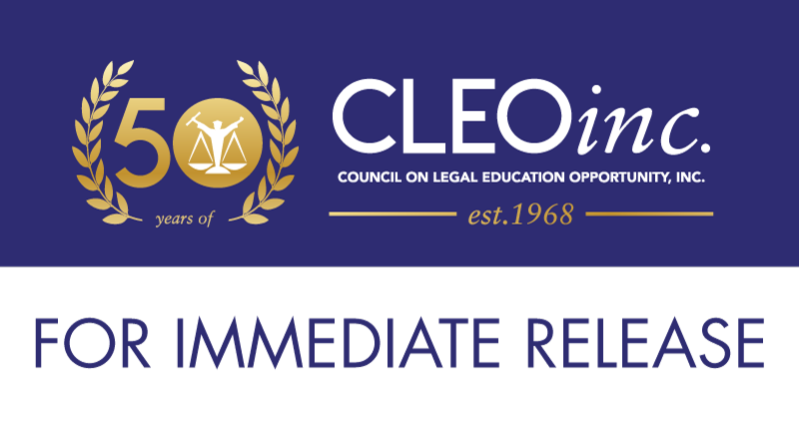FOR IMMEDIATE RELEASE
October 26, 2017
Contact: Bernetta J. Hayes, Director
Prelaw Programs Operations
bhayes@cleoinc.org – 240.582.8600 x203
Council on Legal Education Opportunity, Inc. urges the American Bar Association
to retain the LSAT as the standard for law school admissions
Largo, Maryland – The Council on Legal Education Opportunity, Inc. (CLEO) urges the American Bar Association (ABA) to retain the requirement of the Law School Admission Test (LSAT) for law school admissions. CLEO also calls on the ABA to clarify that no other test should serve as a substitute for the LSAT. CLEO asserts the reliance on any other test should be confined to a small number of candidates under limited circumstances, such as those who may have recently taken another admission test as part of a joint-degree program. While other standardized tests have their specific utility, none of them serves the same purpose as the LSAT, nor have they been developed specifically for the purpose of predicting the test-taker’s ability to succeed in law school. The LSAT is the gold standard that has successfully identified applicants’ preparedness for the study of law for the past 70 years – – in particular, by testing logic, reasoning, and critical thinking capabilities.
CLEO supports the concept of an admissions process that includes a variety of indicators to assess a student’s likelihood of succeeding in law school, but also believes that having one predictive tool common to every applicant promotes equal treatment for all. The LSAT serves this important goal.
Moreover, because of structural inequality throughout our nation’s educational system, if every student is to be given an opportunity to develop his/her full range of skills and values, law school academic support programs must be calibrated to their particular student body. In 1993, CLEO and LSAC helped create the foundation for the growth of academic support programs throughout legal education. Today, these programs contribute to academic success not only for historically under-represented ethnic students and socioeconomically disadvantaged students, but for all students. Having one standard predictive factor, the LSAT, enhances this process.
“As we look forward to celebrating our 50th Anniversary in 2018, we believe that legal education is at an important crossroads,” says Cassandra Sneed Ogden, CLEO’s Chief Executive Officer. “While we understand and support the desire of law schools to open their doors even wider to candidates from science, technology, engineering, mathematics, and other disciplines, we urge law schools to retain the LSAT as their primary admissions test and implement a more holistic admissions process.”
A holistic admission process would consider not only Grade Point Average and LSAT scores, but also other markers of success in the practice of law, such as, a student’s motivation and achievements prior, during, and since undergraduate school. CLEO used such an approach in developing the CLEO Legally Inspired Cohort (CLIC) pilot program that was implemented with four partner law schools in 2016. The program was based on the concept that if a student is prepared, develops his/her critical thinking skills, has a peer support network, and is part of a nurturing, supportive legal education community, he/she can be a successful law graduate, despite low admissions indicators. All of the 15 students who began the pilot program are now in their second year of law school.
Lawyers become leaders in so many areas of society, thus it is especially important to CLEO and LSAC that the legal academy provide pathways to the profession for students from all backgrounds and identities. In fact, LSAC was created by law schools more than 70 years ago, in part, to help end the literal “old boys” network, and collaborated with the ABA, Association of American Law Schools, and the National Bar Association in establishing CLEO in 1968 to provide wider access for students of color.
CLEO values LSAC’s long-standing leadership in law school admissions, which includes not only the LSAT, but also the creation and maintenance of an infrastructure that supports CLEO’s and law schools’ efforts to advance equality, diversity, and fairness in law school admissions. Like CLEO, LSAC has been a driving force in helping people of color and others who are under-represented in the legal profession gain fair access to an education that empowers them to advance the cause of equal justice.
“Although significant progress toward greater equity and inclusion in law has been made through the efforts of CLEO and others, much more remains to be done,” asserts Ogden. “And as CLEO prepares to celebrate 50 years of success, we stand with LSAC and other allies looking forward to the next 50 years of advancing excellence—which must include diversity and inclusion—in legal education and ultimately in the legal profession.”
###
Council on Legal Education Opportunity, Inc. (CLEO) is a national organization that was founded in 1968 to expand opportunities for minority and low-income students to attend law school. Since its inception, more than 10,000 students have participated in CLEO’s programs and joined the legal profession. Learn more about CLEO by visiting www.cleoinc.org.

